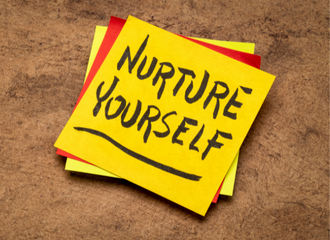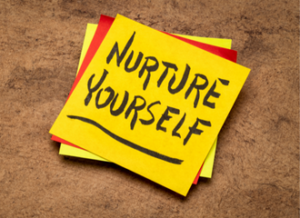Self-care can be difficult and uncomfortable for individuals struggling with an eating disorder. But it’s also a critical part of the recovery process.
What comes to mind when you think of self-care? Do you think of shopping sprees, applying face masks, fine dining, or extravagant vacations? To many people, self-care translates to “Treat yourself!” But self-care is much more meaningful and essential to a balanced, fulfilling life.
According to the World Health Organization (WHO), self-care is “the ability of individuals, families, and communities to promote health, prevent disease, maintain health, and to cope with illness and disability with or without the support of a healthcare provider.”
Self-care includes any activity you do deliberately to take care of you. Self-care is not selfishness nor self-indulgence; it promotes personal wellbeing.
Self-care & eating disorders
For individuals struggling with an eating disorder, self-care can be difficult, uncomfortable, and even non-existent. Eating disorders are disorders of disconnection. Those who struggle with eating disorders often report feeling disconnected from not only food and their bodies, but also from others. When you disconnect from your body, you may have difficulty accessing your inner, emotional world and the many messages your body tries to communicate.
Why should self-care be a priority during recovery?
Self-care requires honest reflection, self-compassion, and adjustment to present circumstances. “Self-care helps to prevent burnout or compassion fatigue and promotes stress-management and resiliency to life’s stressors,” says Kimberly Rattray, Primary Therapist at The Renfrew Center of West Palm Beach. “Essentially, self-care is self-preservation,” says Kimberly.
What are some common examples of self-care?
Material items are often marketed as self-care, though they hold very little value in promoting actual health and wellness and are not always attainable for many people. Though the specific activities vary from person to person, self-care should be accessible while bringing peace, clarity, energy, and inspiration. We encourage you explore what self-care means to you and what you’ll find most important on this journey.
Examples may include:
- getting adequate rest
- eating nourishing and satisfying foods
- maintaining balanced work/life routine
- engaging in joyful or intuitive movement
- meditating
- setting healthy boundaries
- practicing grounding/breathing techniques
- cleaning/organizing
- following up with medical care
- participating in hobbies
- spending time with loved ones
The Four Pillars of Self-Care
Self-care is important not only for your body, but also your physical, emotional, mental, and spiritual health. These four categories are known as The Four Pillars of Self-Care. After you’ve taken time to understand what self-care needs will benefit you the most, you can break your priorities into those four categories.
Finding time to incorporate self-care into your daily life can help decrease symptoms of depression, anxiety, stress, and other mental health issues. It’s important to find time and take care of yourself.
Physical Self-Care
Physical self-care is nurturing your physical needs. It has everything to do with how we take care of our bodies and how we feel. For many of us, physical self-care is anything related to movement and nutrition, but it can also include things that bring relaxation such as stretching, deep breathing, and massages. It’s important to have balance.
Emotional Self-Care
Emotional self-care is the practice of nurturing your feelings. It involves caring for your emotional needs by first identifying, accepting, and fully experiencing them without judgment. This allows you to become more mindfully aware of the connections between your mind, body, and spirit. Taking care of your emotions and needs can help you choose adaptive responses in tough situations, improve relationships, boost your confidence, and decrease overall stress.
Mental Self-Care
Mental self-care focuses on your overall mental health and well-being. It’s every bit as important as your physical health. Nourish your mind by noticing and reappraising judgmental thoughts, joining a support group, reading about mental health, journaling, scheduling a therapy appointment, or engaging in brain stimulating activities.
Spiritual Self-Care
Spiritual self-care is a practice that involves connecting with your higher or authentic self. Spirituality has different meanings for different people such as religion, cultural traditions, nature, or even art. It can be anything that is meaningful and sacred to you.
Self-care tips & eating disorder recovery
As you move through recovery, you will begin to see self-care as a form of self-compassion. If you are unsure of how to start, here are a few tips to help get your started:
- Practice identifying your emotions and needs
- Set boundaries and give yourself permission to say “no”
- Try something new
- Take a social media break
- Spend time outside
- Journal
Conclusion
Self-care is more of a mental shift that encourages you to set aside time for yourself. We encourage you to practice self-care as often as possible and acknowledge that self-care is not always accessible to everyone at all times. If you are able to access some forms of self-care, no matter how small, gradually you’ll see the positive changes such as reduced stress, and better overall well-being.
Mental Health Awareness Month
May is Mental Health Awareness Month and we’re offering FREE tools on our website such as a Self-Care Checklist and a variety of inspirational coloring pages. All these tools can be downloaded below.
Self-Care Checklist
Take time to explore some of the items on our self-care checklist. Cross off what doesn’t fit your life right now and add the things that do. Click here to download and start planning your self-care journey!
Coloring Pages
If you’re looking for an uplifting way to unwind and relax, pull out the crayons, colored pencils and markers. Check out our FREE Printable coloring pages featuring a variety of inspirational quotes! Be sure to tag us (@RenfrewCenter) in your completed artwork on social media.
The Renfrew Center Mandala Coloring Book 1




